[vc_row][vc_column][vc_single_image image=”949″ img_size=”full” alignment=”center”][vc_custom_heading text=”“A Piece of My Mind”” font_container=”tag:h1|font_size:50px|text_align:center|color:%232633ef” google_fonts=”font_family:Bitter%3Aregular%2Citalic%2C700|font_style:700%20bold%20regular%3A700%3Anormal”][vc_custom_heading text=”October 2020 Newsletter” font_container=”tag:h1|font_size:30px|text_align:center|color:%232633ef” google_fonts=”font_family:Bitter%3Aregular%2Citalic%2C700″][/vc_column][/vc_row][vc_row][vc_column width=”2/3″][vc_column_text]
Advancing Christian Faith and Values,
Defending Religious Liberty for All,
Supporting Civility and the Common Good
through Preaching, Teaching, Writing, Activism and Reasoned Conversations
www.donaldshoemakerministries.com[/vc_column_text][/vc_column][vc_column width=”1/3″][vc_single_image image=”1304″ img_size=”full” alignment=”center”][/vc_column][/vc_row][vc_row css=”.vc_custom_1598373738095{border-radius: 3px !important;}”][vc_column][vc_column_text]
Back the Badge
“Blessed are those who maintain justice.” – Psalm 106:3
[/vc_column_text][/vc_column][/vc_row][vc_row css=”.vc_custom_1598373738095{border-radius: 3px !important;}”][vc_column width=”1/4″][vc_single_image image=”1436″ img_size=”full” alignment=”center”][/vc_column][vc_column width=”1/2″][vc_column_text]
Losing Leadership in Its Prime
“As a man of integrity, I will not sit idly by while outside entities attempt to destroy my character.”
– Former Rochester NY Chief La’Ron Singletary
[/vc_column_text][/vc_column][vc_column width=”1/4″][vc_single_image image=”1437″ img_size=”full” alignment=”center”][/vc_column][/vc_row][vc_row css=”.vc_custom_1598373738095{border-radius: 3px !important;}”][vc_column][vc_column_text]Seattle Police Chief Carmen Best resigned after Seattle’s City Council cut the police budget to the point of putting her in a “position destined to fail.”
“Their careers, a testament to racial advancement, are collateral damage. The complexities of their jobs aren’t discussable. Instead, liberals and many others—in and out of politics—hide behind the virtue of the moment, intimidated by social media and the social-justice sentiments of millennials.” – Daniel Henninger, The Wall Street Journal, September 10, 2020
[/vc_column_text][/vc_column][/vc_row][vc_row css=”.vc_custom_1598373738095{border-radius: 3px !important;}”][vc_column][vc_column_text]
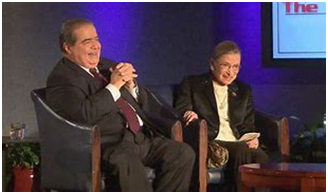 Justices Antonin Scalia & Ruth Bader Ginsburg:
Justices Antonin Scalia & Ruth Bader Ginsburg:
Exemplary People of Civility
As Americans reflect on the life and legal career of Ruth Bader Ginsburg during these politically contentious days, we should not miss her warm friendship with her ideological opposite on the U.S. Supreme Court—Antonin Scalia (she a liberal Jewish woman and he a conservative icon and devout Catholic Christian). They served on the Supreme Court together from Justice Ginsburg’s start in 1993 until Justice Scalia’s death in 2016.
It is an example of personal friendship and civility that governmental people and political activists need to heed. Both enjoyed intense discussions over issues and the law. Both had a great sense of humor.
“Their friendship can offer Americans an important lesson in these tense times. They remind us that we share a lot more than politics,” Scalia’s son, Chris, told CNA [Catholic News Agency] late last year.
“There’s a lot more to life than political opinion. It is possible to disagree with somebody, to have different outlooks on life and politics and the law and your profession, but focus instead on what you have in common, and the things in life that you both enjoy, and focus on those things, and develop a real friendship out of those things.”
Scalia’s love of debate was one of the things that drew him to Ginsburg— a woman with whom he disagreed on many things, including many aspects of the law. But Scalia admired Ginsburg’s determination, especially in an era when it was harder for women to achieve the career success that Ginsburg attained. – NCR, Sept. 22
This election season I am seeing the worst political polarization since the election of 1968, when the Democratic Party was split over war issues and George Wallace ran as a third-party presidential candidate. The lack of interaction and incivility toward political opposites this season stands in sharp contrast to the friendship of Justices Ginsburg and Scalia.
[Sources: Kenneth W. Starr, “Equality’s Gracious Champion,” Washington Post, Sept. 21, 2020; “Recalling the Unlikely Ginsburg-Scalia Friendship,” National Catholic Register, Sept. 22, 2020][/vc_column_text][/vc_column][/vc_row][vc_row][vc_column][vc_column_text]
Bible Insight – Civil Disobedience “The Bible Way”
Part 2 of 2 – Paul, Citizen-Evangelist
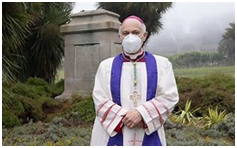 Catholic Archbishop Salvatore J. Cordileone
Catholic Archbishop Salvatore J. Cordileone
has called on the City of San Francisco to end its excessive restrictions on worship.
I never expected that the most basic religious freedom, the right to worship — protected so robustly in our Constitution’s First Amendment — would be unjustly repressed by an American government.
But that is exactly what is happening in San Francisco. For months now, the city has limited worship services to just 12 people outdoors. Worship inside our own churches is banned. The city recently announced it will now allow 50 for outdoor worship, with a goal of permitting indoor services up to a maximum of 25 people by Oct. 1 — less than 1 percent of the capacity of San Francisco’s St. Mary’s Cathedral.
This is not nearly enough to accommodate the hundreds of thousands of Catholics in San Francisco. In imposing these restrictions, the city is turning a great many faithful away from their houses of prayer. [Washington Post, September 16, 2020]
Being able to gather for worship in Protestant churches or to receive the Holy Eucharist at a Catholic mass are among the most sacred activities that Christians can do. They constitute worshipful obedience to God.
Only a compelling state reason should justify limitations on church gatherings. The limitations should be the least necessary to accomplish the justifiable reason. Religious gatherings should not be bound by stronger restrictions than other gatherings face (implications of the 1st and 14th Amendments).
If efforts to gain more freedom to worship fail, has the time come for San Francisco churches en masse to engage in civil disobedience?
Last month I talked about examples and principles of civil disobedience from the Bible’s “Book of Daniel.” I set forth the teachings of Martin Luther King, Jr.
Civil disobedience may be justified if the state forbids us from exercising what our faith commands or forces us to do what our faith forbids. In either situation, it is fitting to strive first for a “win/win” accommodation.
Civil disobedience demands we are willing to accept the penalty that a law imposes, and by this we show respect for law.
What do we learn about Paul, the Evangelist and Roman Citizen?
First we consider a lesson taught by the Apostle Peter and the other apostles. This came from a situation that happened before Saul of Tarsus (who became Paul the Apostle) was even a believer.
The apostles were arrested for teaching about Jesus in the court of the Temple. They told the chief priest, who had given them strict orders not to teach about Jesus, “We must obey God rather than men!” (Acts 5:29).
To be accurate, we note that the order violated was a religious order, not a governmental one. Still, it seems to me that Peter’s word must be applied to secular laws that bring believers into conflict with the edicts of their faith.
Now, second, we examine the words and actions of the Apostle Paul during three of his life experiences. We bear in mind that he was a Roman citizen by birth—a status to be cherished (a Roman military commander told Paul, “I had to pay a high price for my citizenship” – Acts 22:28). Citizenship provided many privileges and protections. But, of course, not the right to vote.
The first experience of Paul we must notice happened a couple of years earlier in the City of Philippi. He and his co-evangelist Silas were jailed because they had exorcised a demon from a fortunetelling slave girl, much to her owners’ chagrin (Acts 16:21). This would not be the last time Christianity is opposed because its values clash with exploitive monetary gain!
Paul and Silas were stripped and severely beaten by Roman soldiers by order of the magistrate and then jailed with their feet in stocks (Acts 16:22-24).
The next day the magistrates ordered the release of Paul and Silas. They were told, in essence, to leave town quickly and quietly. Paul would have none of it! “They beat us publicly and without a trial even though we are Roman citizens, and threw us into prison,” Paul told the officers. “And now do they want to get rid of us quietly? No, Let them come themselves and escort us out!”
At this moment Paul engaged in civil disobedience! “No, we will not leave town quietly!” He demanded a public parade! When the officers reported this to the magistrates they were full of fear, for they had beaten and jailed Roman citizens unlawfully. “They came to appease them and escorted them from the prison.” Read the entire interesting story as recorded in Acts 16:16-40).
The second experience was when Roman soldiers rescued Paul from a mob. More interested in quelling strife than in understanding religious questions, the Roman commander rescued Paul and bound him in chains. Paul gained the commander’s consent allowing him to address the crowd, which only induced more bedlam. Frustrated to the inth degree, the commander ordered Paul to be taken to the barracks, flogged and questioned.
At that point, Paul asserted his rights as a Roman citizen: “Is it legal for you to flog a Roman citizen who hasn’t even been found guilty?” Result: “The commander himself was alarmed when he realized that he had put Paul, a Roman citizen, in chains.” Read the whole story: Acts 21:27 – 22:29.
Third and finally, Paul would assert his right as a Roman citizen to appeal his case to Caesar (Acts 25:10-12).
Here are two practical points from what we learn:
First, we should follow Paul’s example and exercise our rights as citizens of the United States. Exercise them as boldly and extensively as the need requires. Exercise them not only for religious freedom and the right to worship and serve God, but to secure your own honor and safety as a citizen.
Second, we again see that civil disobedience is appropriate when we are forbidden to practice our faith (such as the right to preach the gospel or our right to assemble in worship). It is also appropriate as a way to force attention to an unjust government order (“quiet release” from prison).
We should now see the relevance of civil disobedience to unfair restrictions against church gatherings. Is it time for churches to bind together and resist a state or county restriction that regards religious activities as “non-essential” and restricts them more than other activities (like gambling or shopping or dining)? It seems we are almost at that point.[/vc_column_text][/vc_column][/vc_row][vc_row][vc_column][vc_column_text]
 Message of the Month
Message of the Month
Who knows what Jesus would
do in today’s political climate?
“WWJD?” was asked by Al Sharpton and Doug Pagitt in a column in TIME (on-line, August 27, 2020). Pagitt is a leftist evangelical political activist who leads a congregation in Minneapolis called “Solomon’s Porch.”
Weighing whether or not to support Trump this year, white Christians should consider a simple, familiar question: What would Jesus do?
This election is a test of faith–much like the one in the gospel story of Jesus’ temptation. Jesus does not give in to Satan’s promises, choosing integrity over power. Trump’s promise of white Christian supremacy is a similar test.
Truth be told, I’m pretty well versed in political conversations and I’ve never heard Mr. Trump promise anything close to the notion of “white Christian supremacy” in the U.S. Most Evangelical Christians would distance themselves from him if he ever did, and I’d be one of the first to do so. The authors must give evidence of this charge or be guilty of bearing false witness.
And truth be told, I confess I have little idea what view Jesus would take on many modern issues and it is presumptuous of Christians to think they know. I know Jesus’ teachings shape the character of his followers (for example, see The Beatitudes in Matthew 5:1-12). But it is a leap to take his teachings and apply them to politics and government policies and officials. Certainly Jesus doesn’t teach us how to cast our ballots. Nor is how we vote in the upcoming presidential election a “test of faith” on whether we will follow Jesus or not.
I do know that Jesus’ company of followers (“the 12 disciples”) included an anti-Roman zealot named Simon and a tax collector for Rome named Matthew. Now that’s quite a political spread and may have led to some heated discussion among the disciples. But maybe Jesus kept them quiet—political persuasions shouldn’t interfere with following Jesus anyway.
Here are five points on Jesus’ teaching that I think are relevant to today’s political situation:
1. Jesus taught that all human authority is given by God.
This is a great theme in the Book of Daniel: “The Most High is sovereign over the kingdoms of men and gives them to anyone he wishes” (Daniel 4:25). When he was on trial before the Roman governor Pontius Pilate, Jesus said to him, “You would have no power over me if it were not given to you from above” (John 19:11).
Our citizenship enables us to select leaders and affect government in many ways. But ultimately God is in charge. Wins and loses are in God’s hands. This must not cause us to slack off, but it should encourage us.
2. Jesus taught about our duties to both the Kingdom of God and the particular “kingdom of man” to which we belong.
“Give to Caesar what is Caesar’s, and to God what is God’s” (Luke 20:25).
Jesus taught that God’s Kingdom and Caesar’s realm are distinct and we have duties to both. Jesus’ kingdom is unlike any kingdom on earth. “My kingdom is not of this world,” Jesus told Pilate (John 18:36).
By its nature, God’s kingdom is all-inclusive whereas Caesar’s realm is abridged. To Caesar we give limited loyalty; to God we give complete loyalty.
We can and should fulfill limited duties as members of a particular “kingdom of man.” In sum, the New Testament teaches us: Pray for your rulers, pay your taxes, obey and show honor to rulers of both lesser and greater authority (see Romans 13:1-7; 1 Timothy 2:1-5; Titus 3:1-2; 1 Peter 2:13-17).
The New Testament tells followers of Jesus how to live under authoritarian government. The right to vote would have never entered the authors’ minds.
How do we “give to Caesar” today as we live in a participative democracy? Churches can take positions and expend effort on moral issues, register voters, encourage members to write legislators and other political leaders on issues, and encourage their members to get involved in worthy causes and to vote (but not tell them for whom to vote).
The church should use its voice to encourage CIVILITY, for it is severely lacking in today’s supercharged political atmosphere. Both LEFT and RIGHT are failing at CIVILITY, from the president and others at the top on down.
3. Jesus taught us the priority of Kingdom Values.
“Seek first the Kingdom of God and his righteousness…” (Matthew 6:33).
We must always maintain a distinction between the ultimate issues of the Kingdom of God and the penultimate possibilities of the political process. The latter are worthwhile but not perfect. They are secondary and not primary. They need the church’s voice and attention but must not get top billing.
Our churches must teach on morally laden issues and proposals like good or bad legislation or initiatives. But be sure that the biblical “connectedness” is made clear. Of course we must be sensitive to the congregation and visitors in such matters, but avoiding the topics should not be considered an option.
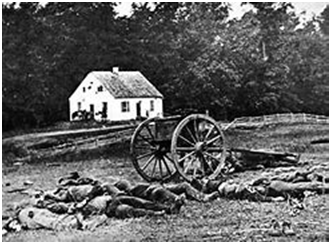
Fallen soldiers near the Dunkard church
4. Jesus taught his followers to be “people of peace.”
My denomination was known in years gone by as German Baptists or (horrors!) “Dunkards” (referring to how they baptized)—a “peace church.” It had a simple meetinghouse where the Battle of Antietam was fought during the Civil War. Antietam was the war’s bloodiest battle. The reconstructed church structure stands today as a witness to a Christian group committed to peacemaking.
Jesus taught us The Beatitudes (Mt. 5:1-12), which should mark our political discourse. Be poor in spirit (not proud or haughty or arrogant in spirit). Be mournful and meek. Hunger and thirst after righteousness. Be merciful, pure in heart, and peacemakers. Rejoice in persecution. Those who show these qualities become salt to the world and a light that cannot be hidden.
Today’s political atmosphere creates political enemies. One Seattle council member boasts, “I don’t have any Republican friends.” Sad commentary. Well, if they’re not your friends, how should political enemies be treated?
Jesus taught, “Love your enemies and pray for those who persecute you…
If you love those who love you, what reward will you get? Are not even the tax collectors doing that? And if you greet only your brothers, what are you doing more than others? Do not even pagans do that?” (Matthew 5:44, 46-47)
5. Jesus taught that he would build his church through his disciples who are obeying his Great Commission in the world.
The mission of the church is not necessarily to transform governments. The church’s mission is to create new followers (disciples) of Jesus throughout all the world. This is done by baptizing people who confess Jesus and, very important, teaching them to obey all that Jesus has taught us (the Gospel of Matthew, itself, is a “training manual”). Read Matthew 16:18 and 28:18-20.
As the church obeys and expands in this world, the church will find itself intertwined with cultures and governments. There is no way to avoid this. We must engage these with care and determination. We don’t have the luxury of withdrawal from culture or the political process. Jesus’ followers are loyal citizens, but “when push comes to shove” we take our stands.
Our churches can’t escape politics but we can rise above it. Our message is not political. We come together to uplift God’s Kingdom and hear from Jesus. The unity of the church must transcend all political and secular alliances.
Some Christians don’t like to hear me say this, but the church, in order to be Jesus’ church and a witness to the world, must be the place where a conservative Republican and a liberal Democrat can join hands and sing,
We are one in the bond of love…
Let us join our hand that the world will know,
We are one in the bond of love.
– Otis Skillings (1971)
[/vc_column_text][/vc_column][/vc_row][vc_row][vc_column][vc_column_text]
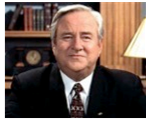 What Motivated Jerry Falwell
What Motivated Jerry Falwell
and “Moral Majority”?
(Dishonesty and Inaccuracy When Describing Christian Activism)
I hesitate to call anyone a liar—a misstatement has to jump through some hoops (intentionality, careless disregard for the truth, malice, etc.) to make one a liar. But these writers come really close.
August 3, 2020 – Washington Post columnist Jennifer Ruben reported on her interview of Robert P. Jones, author of White Too Long: The Legacy of White Supremacy in American Christianity. His words:
The one enduring, animating issue that fueled white flight from the Democratic Party to the Republican Party has been civil rights for African Americans. This was the issue that originally pulled Jerry Falwell Sr. out from behind the pulpit and into organizing the Christian right political movement. [BOLD mine]
A similar “read” of the “Christian right” came from Max Blumenthal:
But were it not for the federal government’s attempts to enable little black boys and black girls to go to school with little white boys and white girls, the Christian right’s culture war would likely never have come into being. – Max Blumenthal, “Agent of Intolerance”, The Nation, May 26, 2007
“Likely” is the wiggle-word, but the sentence is false with it or without it.
So we are supposed to think that the REAL reason for the rise of Moral Majority (founded by Jerry Falwell in 1979) and other right-wing religious groups was opposition to integration and civil rights for blacks. We are told that issues like abortion were late additions to this root issue—sort of superficial window dressing.
I cannot speak to the motives behind every founder or member of Religious Right groups. Some may have had segregationist sentiments. What I can assert emphatically is that the Religious Right rose because of very different issues, and segregation or racism was not part of its undergirding.
I joined the Right to Life movement in 1972. It was a lonely place for Protestant ministers in those days. The movement was overwhelmingly Catholic. If a Protestant minister showed up at an event, he was pretty much guaranteed a seat on the platform and maybe even a spot in the program!
All this changed with the rise of Moral Majority and similar efforts. By the time I served as Chairman of the National Right to Life Convention in 1980 the level of evangelical participation was remarkably higher. And these new activists were intensely pro-life and didn’t bring any racism to the table.
If there was any single reason for slow involvement in Right to Life causes by evangelical Christians, it wasn’t racists looking for a superficial cause. It was hesitation to work alongside Catholics on public issues. This was very new.
Moral Majority had several pillars, none of which were segregationist or racist in any way. Pro-life, Pro-family, Pro-America, Pro-Israel.
Was Jerry Falwell himself racist? Let me give you the words of two ministers I contacted who actually worked closely with him.
From a pastor in Ohio:
I went to work for Jerry’s organization in the fall of 1983. I knew Jerry Sr. I worked at his house during all different 24 hour per day shifts.
I was working for him in the evening during his brief Live TV show in the evenings as well as his Live Sunday morning church service. I was always within close distance of him providing “dignitary protection”.
I traveled with him on occasion to Washington DC and other locations.
I can assure you as a person that was with him over the course of 7 years in all types of private and public situations – I NEVER HEARD HIM SAY ANYTHING IN SUPPORT Of SEGREGATION, EVER. He was supportive of civil rights. There were black members of his congregation. He did local projects to help the black community in Lynchburg.
His main political issue was Abortion. He wanted to awaken the majority of Americans, especially evangelical Americans to register to vote and support what we now call the Pro-Life movement.
From a pastor in Maryland:
I went to Liberty [University] from 1991, with my undergraduate and then onto seminary there and wrapped up in 1998 Lynchburg [VA]. Through those years I knew Dr. Falwell on a personal level.
Falwell was the furthest from a racists of anyone I knew. He gave special scholarships to minorities. When I was a resident assistant there, he also reached out to minorities and they had their own area where about 10% (black population at Liberty) would hang out, and he’d walk over to them and strike up conversations and hug them all.
The primary foundation of The Moral Majority after 7 years of Roe V. Wade being legalized in 1973, was to start a ‘grass roots operation’ to wake up the evangelical Christian silence on moral issues. Thus, the “moral majority.”
Well-known black pastor E. V. Hill of Mount Zion Missionary Baptist Church in Los Angeles once preached at Falwell’s church. Falwell recalled that sermon when he addressed the crowd of 4000 at Pastor Hill’s funeral in 2003, an event attended by many government officials and others from the civil rights movement. According to the Los Angeles Times (March 9, 2003):
Among those present Saturday was the Rev. Jerry Falwell, founder of the conservative Moral Majority. Falwell brought the house down when he recalled a question from Hill after Falwell had invited him to preach at Falwell’s church in Lynchburg, Va.
“Jerry, I don’t know how to say this,” Falwell quoted Hill as saying.
“I don’t want to hurt your feelings, but where did that name ‘Lynchburg’ come from?”
Jerry Falwell died on May 15, 2007. Civil rights activist Jesse Jackson paid him a tribute that day, saying that while they had their differences, “He had a heart of gold.”[/vc_column_text][/vc_column][/vc_row][vc_row][vc_column][vc_column_text]
Religious Liberty Vigilance
– Free Speech and “Othering”
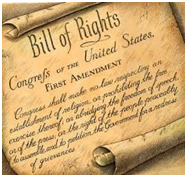 “Congress shall make no law respecting an establishment of religion, or prohibiting the free exercise thereof, or abridging the freedom of speech, or of the press; or the right of the people peaceably to assemble, and to petition the Government for a redress of grievances.”
“Congress shall make no law respecting an establishment of religion, or prohibiting the free exercise thereof, or abridging the freedom of speech, or of the press; or the right of the people peaceably to assemble, and to petition the Government for a redress of grievances.”
– 1st Amendment
I wish every defender of freedom of the press would see what I see: a threat to one freedom secured by the First Amendment is a threat to the other freedoms. If religious freedom (the “First Freedom”) is curtailed, freedom of the press or of speech or assembly will follow. Or the other way around.
At Iowa State University an English professor forbade research topics on certain issues—specifically, writing that is “othering” (creating a distinction between “them” and “us”, contrary to the goals of inclusiveness and diversity). To “other” a culture or individual “is to treat that culture as fundamentally different from another class of individuals often by emphasizing its apartness in traits that differ from one’s own.” (Merriam-Webster)
Here is the key passage from the class syllabus:
GIANT WARNING: any instances of othering that you participate in intentionally (racism, sexism, ableism, homophobia, sorophobia, transphobia, classism, mocking of mental health issues, body shaming, etc.) in class are grounds for dismissal from the classroom. The same goes for any papers/projects: you cannot choose any topic that takes at its base that one side doesn’t deserve the same basic human rights as you do (ie: no arguments against gay marriage, abortion, Black Lives Matter, etc.). I take this seriously. [Notice how nothing is said against “religious othering.” – DS]
Well, good for Iowa State U, which took the matter seriously too, finding the warning a violation of student academic freedom:
The syllabus statement as written was inconsistent with the university’s standards and its commitment to the First Amendment rights of students…
With respect to student expression in the classroom, including the completion of assignments, the university does not take disciplinary action against students based on the content or viewpoints expressed in their speech.
The First Amendment almost always wins in the face of such challenges. But I think the future is bleak, as social pressure drives education to be more “woke” and curriculum, hiring, promoting and granting tenure become more and more driven by ideology and intimidation. Bear in mind also that First Amendment freedoms are not applicable to private institutions.
[ISU incident source: The Volokh Conspiracy, August 18, 2020]
[/vc_column_text][vc_row_inner][vc_column_inner][vc_column_text]
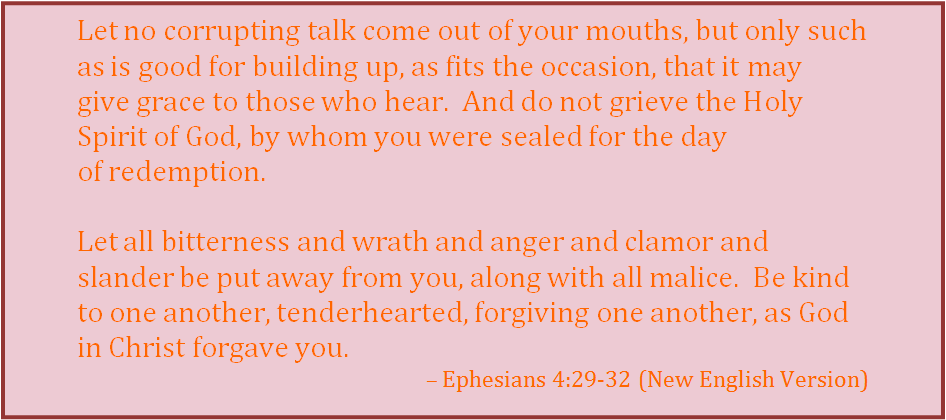 Contact me at: donaldshoemakerministries@verizon.net
Contact me at: donaldshoemakerministries@verizon.net
www.donaldshoemakerministries.com
[/vc_column_text][/vc_column_inner][/vc_row_inner][/vc_column][/vc_row]

